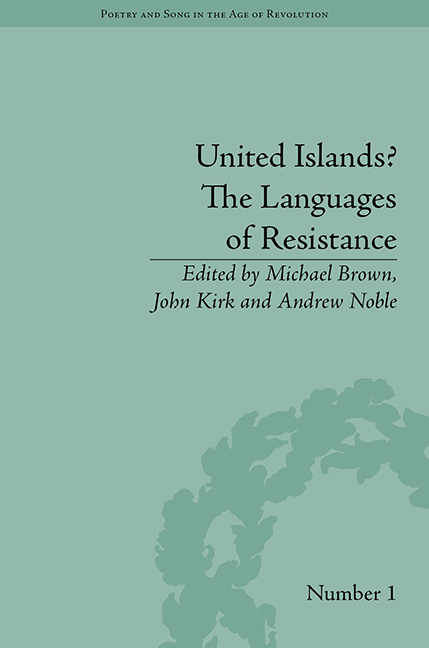Book contents
- Frontmatter
- CONTENTS
- Acknowledgements
- List of Figures and Tables
- List of Contributors
- Introduction: The Languages of Resistance: National Particularities, Universal Aspirations
- 1 Reading the English Political Songs of the 1790s
- 2 Why should the Landlords have the Best Songs? Thomas Spence and the Subversion of Popular Song
- 3 ‘Bard of Liberty’: Iolo Morganwg, Wales and Radical Song
- 4 Canonicity and Radical Evangelicalism: The Case of Thomas Kelly
- 5 Charlotte Brooke's Reliques of Irish Poetry: Eighteenth-Century ‘Irish Song’ and the Politics of Remediation
- 6 Homology, Analogy and the Perception of Irish Radicalism
- 7 Lost Manuscripts and Reactionary Rustling: Was there a Radical Scottish Gaelic Poetry between 1770 and 1820?
- 8 Virile Vernaculars: Radical Sexuality as Social Subversion in Irish Chapbook Verse, 1780–1820
- 9 Thomas Moore and the Problem of Colonial Masculinity in Irish Romanticism
- 10 Radical Politics and Dialect in the British Archipelago
- 11 ‘Theaw Kon Ekspect No Mooar Eawt ov a Pig thin a Grunt’: Searching for the Radical Dialect Voice in Industrial Lancashire and the West Riding, 1798–1819
- Afterword: The Languages of Resistance
- Notes
- Works Cited
- Index
11 - ‘Theaw Kon Ekspect No Mooar Eawt ov a Pig thin a Grunt’: Searching for the Radical Dialect Voice in Industrial Lancashire and the West Riding, 1798–1819
- Frontmatter
- CONTENTS
- Acknowledgements
- List of Figures and Tables
- List of Contributors
- Introduction: The Languages of Resistance: National Particularities, Universal Aspirations
- 1 Reading the English Political Songs of the 1790s
- 2 Why should the Landlords have the Best Songs? Thomas Spence and the Subversion of Popular Song
- 3 ‘Bard of Liberty’: Iolo Morganwg, Wales and Radical Song
- 4 Canonicity and Radical Evangelicalism: The Case of Thomas Kelly
- 5 Charlotte Brooke's Reliques of Irish Poetry: Eighteenth-Century ‘Irish Song’ and the Politics of Remediation
- 6 Homology, Analogy and the Perception of Irish Radicalism
- 7 Lost Manuscripts and Reactionary Rustling: Was there a Radical Scottish Gaelic Poetry between 1770 and 1820?
- 8 Virile Vernaculars: Radical Sexuality as Social Subversion in Irish Chapbook Verse, 1780–1820
- 9 Thomas Moore and the Problem of Colonial Masculinity in Irish Romanticism
- 10 Radical Politics and Dialect in the British Archipelago
- 11 ‘Theaw Kon Ekspect No Mooar Eawt ov a Pig thin a Grunt’: Searching for the Radical Dialect Voice in Industrial Lancashire and the West Riding, 1798–1819
- Afterword: The Languages of Resistance
- Notes
- Works Cited
- Index
Summary
This paper examines the radical voice, as expressed in dialect literature and songs published in Lancashire and the West Riding of Yorkshire during the French and Napoleonic Wars. This was a period of tumultuous political, social and economic change in Britain. For the first time, the working classes became involved in forms of overt political action to campaign for parliamentary reform and an extended franchise: political societies, petitions to parliament and mass demonstrations. For the first time also, the north-west of England was at the heart of this political activity. The industrialization and expansion of Pennine towns and villages encouraged a sense of independence among a critical mass of skilled artisans, miners and textile workers. Inspired by events in France, Thomas Paine's Rights of Man (1791–2), and a longer heritage of ideas about constitutional reform, inhabitants of Lancashire and the West Riding agitated for suffrage.
The loyalist reaction to working-class radicalism in the 1790s is a perennial topic of debate among historians. The main focus has been William Pitt's government and its so-called ‘reign of terror’ against nationally-prominent radicals. Royal proclamations and government legislation against the publication of seditious writings fostered an atmosphere of suspicion about expressions of radicalism in public and in print. Such fears were compounded by the arrests of radical writers and activists. This paper by contrast takes a bottom-up approach to the impact of loyalism. Local loyalist elites and their supporters threatened to silence the radical voice too. ‘Church-and-King’ riots targeted radical printers and ‘Jacobin’ libraries in 1793–95. Attacks on the Manchester Herald, Sheffield Register and Sheffield Iris amongst other newspapers closed formerly highly fruitful published outlets for radical poetry and song.
- Type
- Chapter
- Information
- United Islands?The Languages of Resistance, pp. 181 - 194Publisher: Pickering & ChattoFirst published in: 2014

